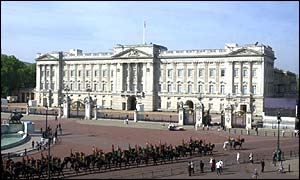| NEWS | SPORT | WEATHER | WORLD SERVICE | A-Z INDEX | ||||||||
|
| You are in: UK: Politics | |||||||||||||||||||||||||||||||||||||||||||||||||||||||||||||||||||||||||||||||||||||||||||||||||||||||||||||||||||||||||||||||||||||||||||||||||||||||||||||||||
|
Tuesday, 18 February, 2003, 15:44 GMT
So what is the Privy Council?

The Queen holds council meetings at her palaces
The council is as old as the monarchy itself, stemming from the close circle of advisers which used to surround the king or queen. Now, however, the most the public know about its existence is when they wonder why some politicians are called "the Right Honourable".
It might sound an elite bunch but as membership is for life, its ranks number more than 500. That makes it a lasting mark of political success, one the neighbours will notice when the post goes to the wrong house. The late Alan Clark tells in his famous diaries how he was buoyed in times of travail by the prospect of getting his "PC" - about as close to political correctness as the maverick MP ever came. Secretive? But he admitted the title had become "somewhat blighted by having acquired, it seems, the status of the medaille militaire in the Charennes hospitals at Verdun", which was awarded to those dying of their wounds. An air of mystery has grown up around the Privy Council, mostly because of the oath which goes back to Tudor times. New members have to pledge to "keep secret all matters ... treated of in council".
Privy Council terms are, however, still used for briefing opposition leaders, for example, on matters of national security. That has happened recently, for example, when Tony Blair met Iain Duncan Smith and Charles Kennedy to discuss his dossier of evidence about Iraq. And ministers cannot get sight of cabinet papers until they have joined the council. The secrecy oath is not the only promise which is sworn. Others include defending the Queen against "all foreign princes, persons, prelates, states or potentates". Marriage and death So what power does the Privy Council actually have? Tony Benn told BBC News Online: "I've been a member since 1964 and it's never met." That is because the full council only comes together on two occasions: when the monarch dies and the council proclaims the accession of their heir; and when a monarch intends to marry.
More tangible is the work of the council's judicial wing, which acts as a court of appeal for the Commonwealth, sometimes where defendants face the death penalty. But 14 Caribbean countries are preparing to ditch the council as their court of last resort. The cabinet itself is also a committee of the Privy Council and serving ministers do go to monthly meetings of the council itself. Recent Orders in Council have included sanctioning measures for breaking the 2000 petrol blockade - although the council is the mechanism rather than the decision maker. Ending deference Former Labour deputy leader Roy Hattersley is among those who complain such meetings are taken up by trivia. Royal appointments are confirmed including, Lord Hattersley, recalls, people like the chaplains of Oxford colleges. He has written: "At worst the Privy Council is neither an instrument of baronial tyranny nor the last bastion of monarchist power." But that view has not stopped him calling for the council to be scrapped, saying it is part of a deferential society. "A genuinely radical government - anxious to promote the idea of equality or meritocracy - would politely suggest to the Queen that she confirmed her desire to modernise the monarchy by announcing that she no longer needed "privy" advisers." Call me mister Yet Tony Benn, despite his republican zeal and opposition to the royal prerogative, is more sanguine. Agreeing the council has no real power or meaning, he said it could not therefore be anti-democratic. "It's a little club really," he said. And the man who famously renounced his peerage added: "The nicest thing about the Privy Council is that you are still 'Mr'." The council's role may come under more scrutiny when the Fabian Society reports on the future of the monarchy. But as Robin Cook, President of the Council, notes, his department has a "unique place in history, provides a service to the executive and to the monarchy". Such longevity - as well as the kudos being a "Rt Hon" brings - are likely to mean this is one exclusive members club set to continue. |
See also:
27 Nov 02 | Americas
12 Sep 00 | UK
08 Mar 00 | M-O
Internet links:
The BBC is not responsible for the content of external internet sites |
|||||||||||||||||||||||||||||||||||||||||||||||||||||||||||||||||||||||||||||||||||||||||||||||||||||||||||||||||||||||||||||||||||||||||||||||||||||||||||||||
 |
||
| ---------------------------------------------------------------------------------- To BBC Sport>> | To BBC Weather>> | To BBC World Service>> ---------------------------------------------------------------------------------- © MMIII | News Sources | Privacy |